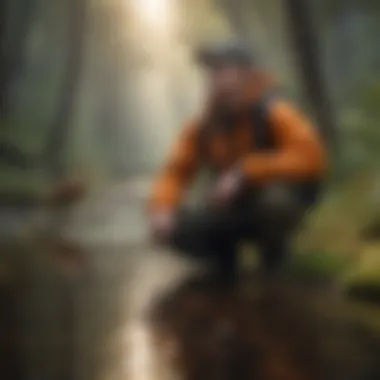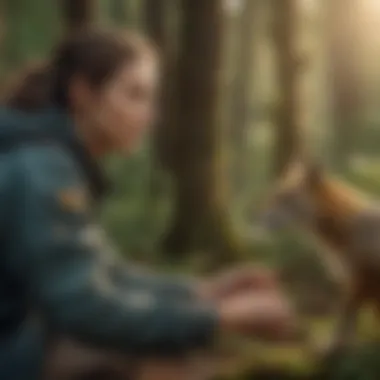Unlocking Diverse Wildlife Careers Without a Degree: A Guide to Opportunities


Evergreen Trees Species
Evergreen trees play a vital role in American forests, encompassing a diverse array of species that contribute to the ecosystem's richness and resilience. From the majestic Douglas fir to the iconic Eastern red cedar, there is a plethora of evergreen tree types to explore. Each species boasts unique characteristics, ranging from their distinctive foliage to their adaptability to various climates and soil types. Understanding the different types of evergreen trees is essential for appreciating their ecological significance and conservation practices.
- Types of Evergreen Trees: In American forests, one can encounter a variety of evergreen tree species such as the towering Ponderosa pine, the aromatic Western red cedar, and the stoic Black spruce. These trees not only provide shelter and food for wildlife but also contribute to the overall health of the forest ecosystem through their resilience and adaptability.
- Ecological Significance: Evergreen trees are crucial for maintaining biodiversity and ecological balance within forests. Their year-round foliage provides habitat for various animal species, while their root systems help prevent soil erosion. Additionally, evergreen trees play a key role in carbon sequestration, aiding in the fight against climate change.
- Conservation Practices: Conservation efforts aimed at protecting evergreen tree species encompass practices such as sustainable logging, reforestation initiatives, and wildlife habitat preservation. By implementing conservation methods, such as controlled logging and forest restoration projects, these practices aim to safeguard the longevity and vitality of evergreen forests for future generations.
Introduction
In today's dynamic world of wildlife conservation and management, one does not necessarily require a traditional degree to embark on a fulfilling career working with animals and nature. This article serves as a comprehensive guide for individuals interested in exploring wildlife careers without the need for a degree, shedding light on the diverse opportunities and pathways available in this arena.
The importance of this topic lies in the accessibility it offers to passionate individuals who may not have pursued formal education in conservation or related fields. By highlighting the range of wildlife career options available to those without a degree, we aim to inspire and provide practical insights into pursuing a career that aligns with one's interests and values.
We will delve into various roles within wildlife conservation that can be pursued without a traditional degree, emphasizing the significance of hands-on experience, specialized training, and dedication. Through this exploration, readers will gain a deeper understanding of how non-traditional pathways can lead to rewarding careers in conservation and management, while also contributing meaningfully to the protection of our natural world. Stay tuned as we uncover the secrets to thriving in wildlife careers without a formal degree.
Wildlife Rehabilitation Careers
Animal Caretaker


As an animal caretaker in the field of wildlife rehabilitation, individuals partake in the daily care and supervision of animals undergoing rehabilitation. This role demands a deep sense of compassion, patience, and attentiveness to the needs of the animals under their charge. Animal caretakers are responsible for feeding, cleaning, and monitoring the progress of the animals, ensuring they receive the necessary treatments and care to support their recovery and eventual return to the wild.
The role of an animal caretaker involves building a bond of trust with the animals, as well as understanding their behaviors and needs to provide the best possible care. It is a hands-on role that requires physical stamina, emotional resilience, and a genuine love for wildlife. Animal caretakers often work closely with wildlife rehabilitators and veterinarians to ensure the holistic well-being of the animals in their care.
Wildlife Rescue Volunteer
Wildlife rescue volunteers serve as the frontline responders to calls concerning injured or distressed wildlife. These volunteers assist in the rescue, transportation, and initial assessment of animals in need, playing a pivotal role in ensuring timely intervention for wildlife in crisis. Wildlife rescue volunteers require a combination of training, empathy, and quick decision-making skills to effectively respond to various rescue scenarios.
Volunteers in wildlife rescue often work under the guidance of wildlife rehabilitators or established wildlife rescue organizations, receiving training on proper handling techniques, first aid for animals, and transport procedures. Their contribution is invaluable in providing immediate care and support to animals in distress, contributing to the overall success of wildlife rehabilitation efforts.
Rehabilitation Assistant
Rehabilitation assistants provide essential support to wildlife rehabilitators and contribute to the day-to-day operations of rehabilitation centers. This role involves a diverse range of tasks, including assisting with animal treatments, preparing diets, maintaining rehabilitation enclosures, and monitoring animal behavior and progress. Rehabilitation assistants work closely with both wildlife rehabilitators and animal caretakers to ensure the smooth functioning of the rehabilitation process.
To excel as a rehabilitation assistant, individuals must possess a blend of organizational skills, attention to detail, and a genuine dedication to wildlife welfare. They play a vital role in the overall rehabilitation journey of the animals, facilitating their recovery and eventual release back into the wild. Rehabilitation assistants form a crucial part of the wildlife rehabilitation team, working harmoniously to promote the well-being of the animals under their care.
Field Research and Conservation Opportunities
Field Technician


Field technicians are essential members of field research and conservation teams. Their primary responsibilities include collecting data, conducting surveys, and assisting with field experiments. Field technicians work closely with researchers and conservationists to carry out fieldwork tasks effectively. They may be involved in setting up research equipment, tracking wildlife movements, and analyzing data. Field technicians play a crucial role in monitoring wildlife populations, studying animal behavior, and assessing the impact of human activities on ecosystems. This role requires strong attention to detail, physical stamina, and a passion for working outdoors in diverse environments.
Conservation Volunteer
Conservation volunteers are dedicated individuals who contribute their time and efforts to conservation projects and initiatives. By volunteering in conservation programs, individuals can support wildlife organizations, national parks, and environmental agencies in their conservation efforts. Conservation volunteers may participate in habitat restoration, wildlife monitoring, and community outreach programs. Their involvement helps raise awareness about conservation issues, engage local communities in conservation activities, and promote sustainable practices. Conservation volunteers gain valuable experience, build strong networks within the conservation community, and make a tangible impact on protecting natural habitats and wildlife species.
Research Assistant
Research assistants play a key role in conducting scientific research related to wildlife conservation and management. They support researchers in collecting data, analyzing samples, and documenting research findings. Research assistants may work in field stations, laboratories, or research facilities to assist with various research projects. Their tasks may include literature reviews, data entry, statistical analysis, and report preparation. Research assistants collaborate with scientists and conservationists to contribute to publications, presentations, and conservation plans. This role requires a solid foundation in research methods, data analysis, and scientific communication, as well as a commitment to advancing knowledge in the field of wildlife conservation.
Ecotourism and Education Positions
In this article, the focus shifts to exploring Ecotourism and Education Positions as valuable avenues for pursuing wildlife careers without a traditional degree. Ecotourism plays a crucial role in promoting environmental conservation by educating the public and raising awareness about biodiversity. Through guided nature tours and interactive experiences, ecotourism allows individuals to appreciate wildlife in their natural habitats while understanding the importance of conservation efforts. Education Positions within the wildlife sector involve imparting knowledge about ecosystems, wildlife behavior, and conservation practices to visitors, students, and the general public.
Nature Guide
The role of a Nature Guide is essential in leading visitors through natural areas, providing in-depth insights into local flora and fauna. Nature Guides possess in-depth knowledge of the environment, ecology, and biodiversity of the region they operate in. They play a vital role in fostering a deeper understanding and appreciation for wildlife among tourists and nature enthusiasts. Nature Guides also focus on promoting sustainable tourism practices that minimize negative impacts on the environment while creating memorable and educational experiences for visitors.
Environmental Educator


Environmental Educators play a pivotal role in raising awareness about environmental issues, conservation practices, and sustainable living. They design and deliver educational programs, workshops, and activities that promote eco-conscious behavior and respect for the natural world. Environmental Educators collaborate with schools, community organizations, and ecotourism companies to engage individuals of all ages in environmental learning and conservation initiatives. Their work aims to inspire future generations to become environmental stewards and conservation advocates.
Ecotourism Specialist
Ecotourism Specialists are experts in developing sustainable tourism practices that prioritize wildlife conservation and environmental protection. They design eco-friendly tour packages, develop conservation projects, and collaborate with local communities to ensure responsible tourism practices. Ecotourism Specialists work towards balancing the economic benefits of tourism with the need to preserve natural habitats and wildlife populations. By creating meaningful and impactful ecotourism experiences, they contribute to the overall well-being of ecosystems and support conservation efforts around the world.
Specialized Wildlife Careers
Specialized wildlife careers play a crucial role in this article by offering unique opportunities for individuals interested in working closely with animals. These careers provide a deeper level of involvement and expertise within the wildlife field, allowing individuals to focus on specific species or ecosystems. By exploring specialized wildlife careers, readers will gain insight into the diverse paths available without a traditional degree. This section will highlight the key aspects, benefits, and considerations of pursuing a specialized wildlife career.
Falconer
Falconry is an ancient art that involves training birds of prey to hunt in cooperation with a human handler. Falconry requires a strong bond between the falconer and the bird, establishing a relationship built on trust and mutual respect. As a falconer, individuals have the opportunity to work closely with majestic birds such as falcons, hawks, and eagles, gaining a deep appreciation for these incredible creatures. This subsection will delve into the training, responsibilities, and rewards of being a falconer, shedding light on the captivating world of falconry.
Aquarist
Aquarists are responsible for the care and maintenance of aquatic animals in aquariums or marine parks. Their role involves ensuring the well-being of marine life, creating suitable environments, and conducting educational programs. As an aquarist, one must possess a deep understanding of marine biology, water quality management, and species-specific requirements. This subsection will explore the day-to-day duties, skills needed, and challenges faced by aquarists, offering a comprehensive view of this specialized wildlife career.
Zookeeper
Zookeepers are vital in the conservation and welfare of captive animals within zoological facilities. They oversee the daily care, enrichment, and health of a diverse range of species, playing a crucial role in educating the public about conservation efforts. Zookeepers work closely with animals, forming bonds and implementing behavior management techniques to ensure the well-being of the animals in their care. This subsection will detail the responsibilities, qualifications, and personal rewards associated with a career as a zookeeper, providing valuable insights into this specialized wildlife career.
Conclusion
Moreover, the benefits of this exploration extend beyond personal fulfillment. By showcasing the potential for hands-on involvement in wildlife rehabilitation, field research, and conservation efforts, this article not only inspires but also educates readers on the diverse roles they can play in safeguarding our natural world. For forestry professionals and academics considering a shift or seeking new avenues within the wildlife industry, this conclusion serves as a roadmap towards seizing non-traditional yet rewarding career opportunities.



